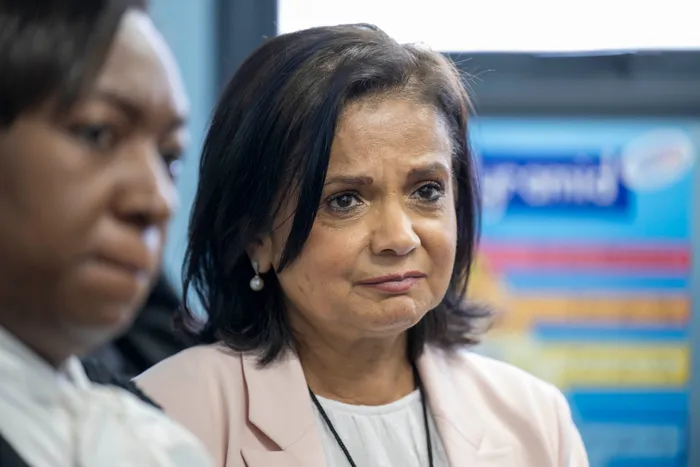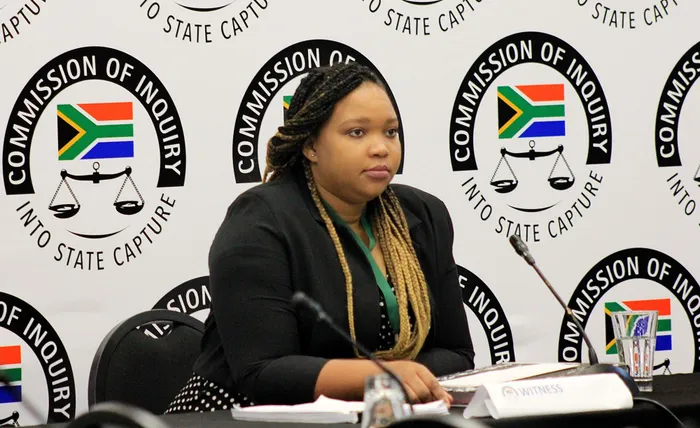NPA's Leadership Crisis: Eroding Legal Integrity in Favour of Political Expediency

Calls intensify for National Director of Public Prosecutions Shamila Batohi's removal as the NPA faces accusations of incompetence and strategic missteps in the wake of a deepening crisis in the criminal justice system.
Image: Henk Kruger/ Independent Newspapers
Clyde N.S. Ramalaine
On 3 June 2025, the Free State High Court in Bloemfontein ruled that the extradition of Moroadi Cholota from the United States to South Africa was unlawful. This landmark judgment has not only released the state’s key figure in the high-profile R255 million asbestos corruption case but also cleared the way for the prosecution of others involved.
Still, it has also exposed deep procedural and constitutional failings within South Africa’s prosecutorial regime. Her unlawful extradition from the United States and subsequent release by the Free State High Court reveal more than just procedural oversight, they expose systemic dysfunction, a repurposing of primary objectives of the NPA as articulated in its strategic ethos within the National Prosecuting Authority (NPA) and unravels the credibility of South Africa’s anti-corruption drive.
The Ruling A Blow to Prosecutorial Credibility
Presiding over the matter, Judge Phillip Loubser was unequivocal: "The prosecution has not found reasonable doubt, or at all, that there was a valid or lawful request from South Africa for the extradition of Ms Cholota from the United States. It follows that if there was no valid extradition request, then the extradition itself was without any basis and, therefore, unlawful."
The National Prosecuting Authority’s (NPA) failure to adhere to the legally mandated process in the extradition request of Moroadi Cholota reveals not merely a procedural blunder, but an institutional failing. By initiating the extradition request instead of the Minister of Justice and Correctional Services, as explicitly required by law, the NPA not only invalidated its case but compromised the integrity of South Africa’s justice system on the international stage.
The NPA will contend that this is not the first time it has led to extradition cases and that this is the first instance in which a case has been registered in this regard. It will furthermore argue that it is appealing the Schultz case, which constitutes a legal precedent.
Notwithstanding this counter, the NPA cannot deny that this deviation from legal protocol suggests either gross incompetence or a willful disregard for constitutional processes, raising serious ethical questions about accountability within the NPA. Moreover, by allegedly providing misleading or incomplete information to U.S. authorities, the South African state stands accused of deception — a charge that, if substantiated, undermines its moral authority and diplomatic credibility, and reveals a prosecutorial body more concerned with performance politics than with the pursuit of justice.
The unlawful handling of Cholota’s extradition reflects a disturbing pattern in which the state weaponises legal instruments while bypassing constitutional safeguards. This erosion of legal integrity in favour of political expediency suggests the NPA, whether by design or acquiescence, has become a tool in internal power struggles rather than a guardian of justice. In failing to uphold the rule of law and misleading an international partner in the process, the NPA exposes a justice system teetering between institutional collapse and captured governance.
The court’s ruling on the lack of jurisdiction underscores a foundational pillar of constitutional and international law, that the legitimacy of a trial is inseparable from the legality of the accused’s presence before the court. In Moroadi Cholota’s case, the unlawful initiation of the extradition process rendered her transfer to South Africa constitutionally defective, thereby stripping the court of jurisdiction to try her. Any attempt to prosecute her under such conditions would not only violate Section 35 of the Constitution, which guarantees fair trial rights and due process but also contravene international legal norms governing extradition and state sovereignty.
This ruling affirms that procedural integrity is not merely a technicality, but a substantive requirement of justice; the state cannot bypass lawful channels to secure an accused and still claim the authority to prosecute. To do so would be to legitimise executive overreach, dismantle legal safeguards, and invite the erosion of the rule of law under the guise of criminal justice.

Moroadi Cholota giving evidence at the Commission of Inquiry into State Capture. Last week the Bloemfontein High Court ruled that her extradition from the United States was unlawful.
Image: Independent Newspapers archive
Systemic Indictment of the NPA
The judgment handed down by the Free State High Court should not be read in isolation; it must be understood as a judicial demand for accountability, procedural discipline, and institutional humility. The NPA’s failed prosecution of Ms Moroadi Cholota is, regrettably, not an isolated mishap. In a 2023 article co-authored with Paul M. Ngobeni (available at: "https://africanewsglobal.co.za/taking-stock-and-keeping-the-npa-and-its-ndpp-batohi-accountable-for-its-disastrous-state-capture-case-prosecution-record/", we called for the NPA leadership to be held accountable as we critically examined eight high-profile cases pursued by the NPA under the rubric of its ‘state capture’ prosecutions. Our analysis revealed a pattern of endemic institutional failures, particularly under the leadership of the current National Director of Public Prosecutions, Advocate Shamila Batohi. Among the most pressing concerns were the following:
Politicisation of Prosecutions
The NPA’s alignment with factional battles in the ANC undermines its credibility. Its selective use of the Zondo Commission’s findings, non-binding and inadmissible in court, has raised alarms about the weaponisation of commissions of inquiry to serve political ends.
Strategic Misuse of Evidence
The collapse of cases like the Estina Dairy Farm prosecution revealed the dangers of substituting public rhetoric for admissible evidence. The NPA has repeatedly stumbled in converting politically sensational findings into courtroom success.
Selective Disclosure and Narrative Framing
The NPA has routinely withheld countervailing evidence, especially in asset forfeiture cases such as Optimum Coal, to curate a prosecutorial narrative while undermining procedural fairness. Civil society organisations such as Freedom Under Law and Corruption Watch have raised repeated concerns about this trend.
Institutional Inefficiencies
Structural deficiencies, ranging from poor leadership and resource mismanagement to political interference, continue to plague the NPA’s capacity to lead credible prosecutions. These points not only relate to individual accountability but also to the need for institutional redesign. The location of the NPA under executive control remains a structural vulnerability.
Lack of Accountability and Transparency
The NPA has consistently deflected public criticism, painting itself as the victim of attacks rather than accepting legitimate concerns about its performance. This erodes public confidence and corrodes prosecutorial independence. Calls for an independent oversight body to scrutinise prosecutorial decisions have gained renewed urgency.
NPA’s Compulsive Overreliance on Appeals – Default Mechanism
As expected, the NPA informed South Africa that it intends to appeal the court’s findings. While the doctrine of appeal is a constitutional provision, it is important to appreciate the context and primary intentions of the state in pursuing such an appeal.
A fundamental yet under-examined pathology within the National Prosecuting Authority (NPA) is its compulsive reliance on appeals, not as a last resort for justice, but as a default mechanism to shield prosecutorial ineptitude. At the heart of this phenomenon lies a psychology unmoored from accountability: senior prosecutors and executive leadership pursue prolonged legal contests not at their own personal or professional expense, but through the seemingly bottomless reservoir of the public fiscus.
This distance between institutional action and individual consequence fosters a culture of indifference towards both fiscal prudence and judicial efficacy. The decision to appeal, often against the weight of legal reasoning and precedent, is thus less a matter of legal necessity than a strategic deflection—an effort to postpone institutional reckoning, preserve internal reputations, and obscure prosecutorial failures.
There appears to be little regard for the economic burden imposed on the state, the rights of the accused whose lives are held in indefinite legal limbo, or the broader erosion of public trust in the justice system.
In the Cholota case, this is strikingly evident: despite the court’s scathing findings, the NPA has signalled its intention to appeal, oblivious to the potential litigation costs should the state be sued for unlawful detention or rights infringements. This illustrates a prosecutorial psychology that prioritises institutional face-saving over constitutional integrity, emboldened by the knowledge that the price of legal misadventure will not be borne by those who authorise it.
In the final analysis, the National Director of Public Prosecutions (NDPP), Advocate Shamila Batohi, can no longer be exempt from the dismal performance of the NPA. She, together with her senior executive team, must be held accountable for the institution’s persistent failures, including the frivolous pursuit of appeals and plausible wasteful expenditure incurred in cases that consistently collapse in court.
The NPA’s demonstrably poor track record in successfully prosecuting its claimed state capture cases, cases that fail to withstand legal scrutiny, underscores a leadership crisis at the heart of the institution. In this epoch, Batohi cannot dismiss these matters as merely 10 to 12 cases out of thousands. She must acknowledge the National Prosecuting Authority’s spectacular failure in effectively prosecuting its state capture cases.
Judge Loubser’s ruling is a reaffirmation of the rule of law. It demonstrates that even in the face of public and political pressure, courts remain the final guardians of constitutional integrity. This case should serve as a caution to state institutions: no matter the political stakes, constitutional due process cannot be bypassed without consequence.
The state’s case against Moroadi Cholota symbolises both a failure of the prosecutorial machinery and a moment of constitutional reckoning. Unless the NPA undertakes urgent internal reform, beginning with depoliticised leadership appointments, independent oversight mechanisms, and full adherence to international legal procedures, its credibility will remain under siege.
This case is not merely about an individual wrongfully prosecuted, but about an institution, the NPA, that appears adrift from constitutional moorings, caught between political ambition and legal obligation, often repurposed for nefarious intentions.
* Clyde N.S. Ramalaine is a theologian, political analyst, lifelong social and economic justice activist, published author, poet, and freelance writer.
** The views expressed do not necessarily reflect the views of IOL or Independent Media.